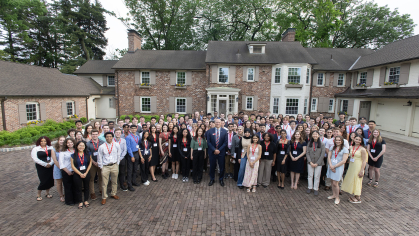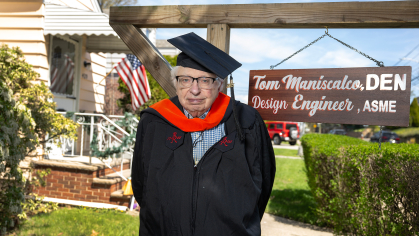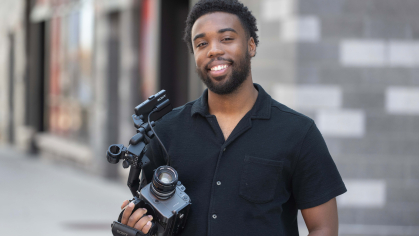Food Hotline Created by Rutgers Seniors Evolves to Meet Students’ Needs
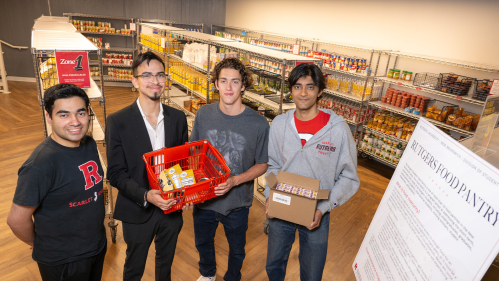
When four first-year students launched a research project to tackle a social issue on campus in 2022, they were shocked to learn that nearly a third of Rutgers-New Brunswick students were identified as food insecure in a basic needs study.
“We were very surprised because we didn’t expect that type of number,” says Thirth Patel, a genetics major. “Imagine a third of your class of students not having access to food.”
They quickly came up with a solution to the problem – a hotline students could call to have meals delivered to them from the Rutgers Food Pantry. The goal was to provide food to students who couldn’t visit the pantry when it was open or who didn’t use it because they felt stigmatized.
Last fall, the hotline’s founders set up a texting service and began delivering food to students across Rutgers’ campuses. They also placed packages of food in a box outside the food pantry in the basement of the College Avenue Student Center.
“It wasn’t so much about just being able to get access to food in general – we weren’t going to just give everyone McDonald’s,” says Steven Montes Montecinos, a biotechnology major. “It was more about the quality of food.”
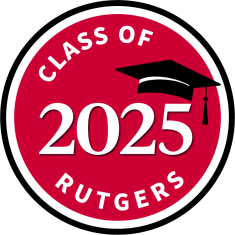
What made the food hotline different from other projects in the class they were taking – the Honors College Forum – was that the proposal was actually implemented, says Talia Robbins, an assistant teaching professor and lead instructor of the course. “Most students don’t end up doing whatever it is that they propose. They come up with a full proposal and then they get busy,” she says. “So these students were really, really persistent.”
The organizers created an official club at Rutgers to operate the hotline and received funding to cover their expenses. But a few months after the hotline opened, it ran into a problem: Not enough students were using it.
“I don’t think enough people knew about it, even though we advertised a lot and we have a ton of volunteers,” says Hassan Choudhry, now a first-year medical student in the Rutgers New Jersey Medical School BA/MD Program. He adds that there were between 10 and 12 students volunteering for two-hour shifts on the project every week.
Instead of walking away from the problem of food insecurity, the students switched gears and have organized programs to discuss the issue with students. Volunteers with the group are planning to work with the Food Pantry next fall in its ambassador program, which focuses on outreach and student engagement.
“The Rutgers Food Hotline was a great model that aimed to increase the reach of the food pantry, which is very important, especially in a huge university like Rutgers,” says Ross Perez, the food pantry’s manager. “Students were able to have food delivered to them when it was more convenient for them, increasing their access to food, which has always been our goal.”
Last fall, the food pantry also added a service that the students had suggested: adding lockers outside the pantry to allow students to access food when the facility is closed.
“We didn’t have the resources to put in lockers but we had mentioned that that was an idea that we were interested in,” says Montes Montecinos, noting he and the other students had been discussing their project with the food pantry’s former manager since 2022.
The Rutgers University Food Hotline was honored by the university with the Revolutionary Award at the 2024 Rutgers Chancellor’s Student Leadership Awards. It also received the Social Impact Award at the 2024 Dr. Jewel Plummer Cobb STEAM Awards.
While the food hotline did not last, the founders believe they made a difference in the lives of students who have food insecurity. “Every single person we helped is meaningful,” says Jonathan Shoham, a biology major who is the club’s president this year. “And I think what matters the most going forward is we have a lot more volunteers and we’re growing.”
In March, the students presented their project to students in the Rutgers Honors College Forum, the same class they had taken four years ago. Robbins says the class was impressed with the project because it gives them confidence to believe that they can do something to solve a community problem.
“I think it gives them a sense that whatever it is that they’re working on, that there’s a possibility that they can make it happen,” Robbins says. “A lot of times it feels like problems are really big and we can’t intervene. And so one thing that I think the group helps them see is that with persistence and purpose, you can get there.”
